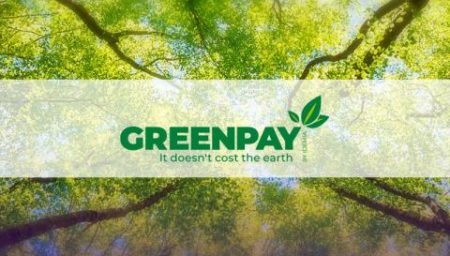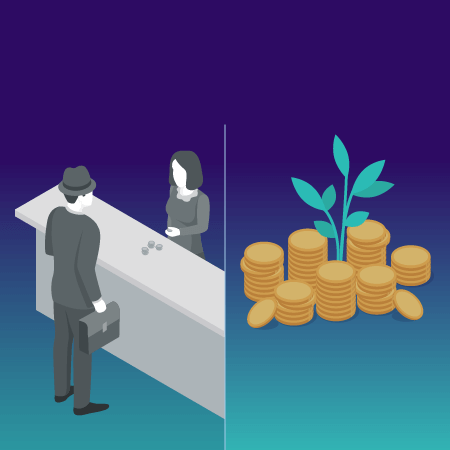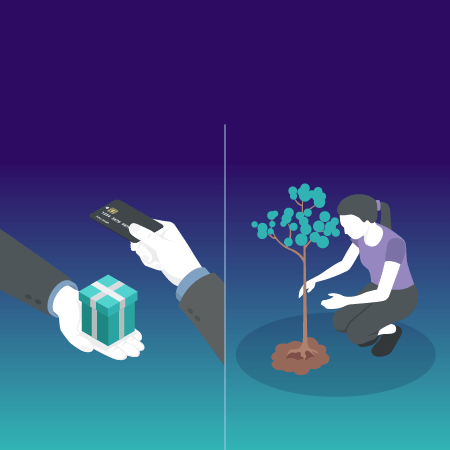Enabling the payment community’s environmental paradigm shift

Today’s consumers like what is socially conscious and expect environmentally friendly banks. They are favoring payment providers who accommodate their values by contributing to a sustainable future.
The global Covid-19 pandemic is far from over, but we are already beginning to see what the new normal will look like. Among the many takeaways, we have realized how much nature impacts our daily lives. While the world’s focus centered on the pandemic for some time, the environment is now firmly back at the top of the global agenda. Climate change is no longer considered as “only” an environmental threat, because it affects all economic sectors1.
Following the extreme weather events of the summer of 2021, we further grasped how environmental factors can directly impact the very fundamentals of our modern society. Case in point, one of the world’s largest consumer goods companies estimated losing hundreds of millions of Euros each year due to worsening water scarcity2.
This increased environmental awareness is underlined by the 54% of global consumers who consider reducing their carbon footprint as more important now than pre-pandemic; and another 58% have become more conscious about how their actions impact the environment than ever before3. Additionally, 71% of US adults care more about product sustainability today than they did a year ago4.
Let’s look at how this reinforced environmental awareness manifests itself within a new wave of sustainable banking and payments practices.
 It can be argued that until not so long ago, the list of what consumers wanted from their bank was fairly short5: a bank branch in proximity, current accounts, mortgages, and maybe insurance. Consumer expectations on “green payments” were all but explicit, or as Visa puts it6 most people didn’t make a connection between current accounts and carbon, savings and sustainability, or payments and the planet. However, there is no doubt that today’s conscious consumers expect environmentally friendly banks.
It can be argued that until not so long ago, the list of what consumers wanted from their bank was fairly short5: a bank branch in proximity, current accounts, mortgages, and maybe insurance. Consumer expectations on “green payments” were all but explicit, or as Visa puts it6 most people didn’t make a connection between current accounts and carbon, savings and sustainability, or payments and the planet. However, there is no doubt that today’s conscious consumers expect environmentally friendly banks.
They favor payment providers who accommodate their values by advancing sustainable banking practices: a whopping 92%7 of consumers worldwide think their bank should actively contribute to preserving the planet, and 87% think their bank should offer eco-friendly payment cards.
As customer expectations evolve, we also see eco-friendly banks around the world increasing their environmental focus via net zero and sustainable banking. A total of 53 banks from 27 countries, representing almost a quarter of global banking assets, have joined the UN-convened Net-Zero Banking alliance created in 2021, committing to align their lending and investment portfolios with net-zero emissions by 20508. Sustainable banking practices will play a vital role as the world transitions towards a sustainable economy; notably by providing capital to finance investments in clean energy, sustainable cities and responsible production. For example, in February 2021, Goldman Sachs settled an $800 million Sustainability Bond to accelerate climate transition9. Nobel Prize-winning American economist Milton Friedman’s influence on the modern global economy can hardly be overstated, and back in 1970, Friedman wrote “the social responsibility of business is to increase its profits”10. This philosophy (also referred to as the “Friedman doctrine”) has held sway over many banks and other businesses ever since. But a fundamentally new sustainable banking paradigm is starting to become visible—today’s environmentally friendly banks are moving from a “linear” focus on maximizing profits to “circular” thinking incorporating environmental and social aspects, serving all stakeholders, not just shareholders.
The plastic payment card is arguably the most recognizable symbol of a bank and its values in the eyes of the bank’s customers; and plastic is perhaps the most visible example of growing environmental awareness across industries and of the shift from a linear to a circular economy. In a linear economy, raw material is extracted from earth and transformed into products that will be used and then thrown away; whereas in a circular paradigm the material, for example plastics, will be recycled and reused as the product reaches end of life. Only 9% of the plastics ever produced have been recycled11 and 12% have been incinerated. Considering that plastic takes more than 400 years to degrade, a large majority still exists in some form12. This challenge has not gone unnoticed as reducing waste, reducing air and water pollution, and tackling plastic pollution in packaging and products are the top three priorities global conscious consumers want to address13.
A growing number of companies are shifting towards a circular plastic approach, for example via the New Plastics Economy Global Commitment initiative, developed by the Ellen McArthur Foundation and the United Nations Environment Program. Over 500 companies (representing 20% of all plastic packaging produced globally, including major beverage brands), governments, financial institutions, universities and other organizations from around the world unite in this initiative to fight plastic waste and pollution. Various consumer goods giants have committed to eliminating PVC packaging, increasing the use of recycled PET, or even launching refillable containers14.
 Given the shift towards a circular economy and the high percentage of plastics ending up in landfills, it makes sense that many environmentally friendly banks around the world have started to introduce green credit cards made out of recycled PVC as a way to reduce the use of plastic while also preventing plastic waste from entering the environment. BBVA has launched cards made out of recycled plastic15 and has announced that all its cards will be made out of recycled materials by 202316.
Given the shift towards a circular economy and the high percentage of plastics ending up in landfills, it makes sense that many environmentally friendly banks around the world have started to introduce green credit cards made out of recycled PVC as a way to reduce the use of plastic while also preventing plastic waste from entering the environment. BBVA has launched cards made out of recycled plastic15 and has announced that all its cards will be made out of recycled materials by 202316.
HSBC has announced it will eliminate single-use PVC plastic payment cards in favor of recycled PVC plastic across all its global locations by the end of 202617.
We also see how issuers around the world are using the card as a lever to support environmental causes. Some eco-friendly banks allow conscious consumers to transform their purchases and rewards into meaningful action for the planet while others donate a portion of their customers’ card purchases to climate friendly causes, and yet another gives cashback on purchases at businesses that are members of the Conscience Coalition18.
 Effective recycling first requires consumers to be aware that the product in question is recyclable. A second factor is how easy it is to recycle the material and if existing local recycling infrastructure is in place. Lastly, there is the question about how fast discarded material decomposes. Paper-based materials rank high on all three of these aspects. As we start to see cardboard cards, designed to be disposed of after a relatively limited period of time and use, one could argue that the payment card future is coming back to its roots: the world’s first payment card, the Diners Club card, was made of cardboard back in 1950.
Effective recycling first requires consumers to be aware that the product in question is recyclable. A second factor is how easy it is to recycle the material and if existing local recycling infrastructure is in place. Lastly, there is the question about how fast discarded material decomposes. Paper-based materials rank high on all three of these aspects. As we start to see cardboard cards, designed to be disposed of after a relatively limited period of time and use, one could argue that the payment card future is coming back to its roots: the world’s first payment card, the Diners Club card, was made of cardboard back in 1950.
Without a doubt, the future of payments and sustainable banking will come in different shades of green. As Noel Quinn, CEO of HSBC put it in a letter to the bank’s customers: “The Covid-19 pandemic has been a wake-up call for all of us. It has rightly focused attention on the actions we all need to take to build a more resilient economy, and create a safer and sustainable world. Of all the threats that humanity faces, a climate crisis has the potential to be the most drastic in its consequences and longevity. This is something that we take very seriously. I believe that the most significant contribution HSBC can make to addressing climate change is supporting you, our business customers, to decarbonize, while ensuring your ongoing resilience and prosperity. Like us, you are aware of the urgency in tackling climate change”19.
1. https://ajssr.springeropen.com/articles/10.1186/s41180-020-00034-3
2. https://thepaypers.com/expert-opinion/how-sustainability-is-changing-the-financial-sector–1250938
3. https://www.mastercard.com/news/press/2021/april/mastercard-unveils-new-carbon-calculator-tool/
4. Stifel, Measuring the Growing Importance of Sustainability for Lifestyle Brand Consumers, 2021
5. https://thefinancialbrand.com/113084/garret-eco-friendly-green-banking-sustainable-strategies-neobanks/
6. https://navigate.visa.com/europe/sustainability/mind-the-sustainability-gap/
7. Global independent poll by “Data 2 decisions” (Dentsu Aegis Network), 2,800 respondents in 10 countries, 2020
8. https://www.unepfi.org/net-zero-banking/
9. https://www.goldmansachs.com/media-relations/press-releases/current/sustainability-bond-feb-2020.html
10. https://en.wikipedia.org/wiki/Friedman_doctrine
11. https://www.unep.org/interactive/beat-plastic-pollution/
12. https://www.nationalgeographic.com/science/article/plastic-produced-recycling-waste-ocean-trash-debris-environment
13. https://www.mastercard.com/news/press/2021/april/mastercard-unveils-new-carbon-calculator-tool/
14. https://www.dove.com/us/en/stories/tips-and-how-to/sweating-tips/introducing-our-first-refillable-reusable-deodorant.html
15. https://www.bbva.com/en/es/bbva-launches-spains-first-card-made-of-recycled-plastic/
16. https://www.bbva.com/en/sustainability/all-bbva-cards-will-be-made-of-recycled-materials-by-2023/
17. https://www.finextra.com/newsarticle/37910/hsbc-to-introduce-recycled-plastic-payment-cards-globally
18. https://funds.aspiration.com/faq/Impact%3EHow-do-I-earn-extra-cash-back-with-Conscience-Coalition-
19. https://www.hsbc.com/news-and-media/hsbc-news/our-net-zero-ambition-a-letter-to-customers